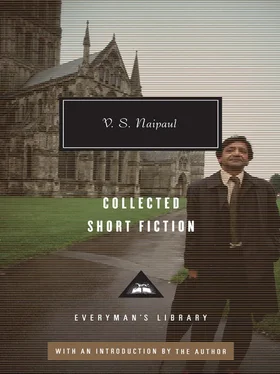Hat shouted out, ‘But what is this I seeing?’ and he showed us the headlines: CALYPSO CARPENTER JAILED.
It was a fantastic story. Popo had been stealing things left and right. All the new furnitures, as Hat called them, hadn’t been made by Popo. He had stolen things and simply remodelled them. He had stolen too much, as a matter of fact, and had had to sell the things he didn’t want. That was how he had been caught. And we understand now why the vans were always outside Popo’s house. Even the paint and the brushes with which he had redecorated the house had been stolen.
Hat spoke for all of us when he said, ‘That man too foolish. Why he had to sell what he thief? Just tell me that. Why?’
We agreed it was a stupid thing to do. But we felt deep inside ourselves that Popo was really a man, perhaps a bigger man than any of us.
And as for my auntie …
Hat said, ‘How much jail he get? A year? With three months off for good behaviour, that’s nine months in all. And I give she three months good behaviour too. And after that, it ain’t going have no more Emelda in Miguel Street, you hear.’
But Emelda never left Miguel Street. She not only kept her job as cook, but she started taking in washing and ironing as well. No one in the street felt sorry that Popo had gone to jail because of the shame; after all, that was a thing that could happen to any of us. They felt sorry only that Emelda was going to be left alone for so long.
He came back as a hero. He was one of the boys. He was a better man than either Hat or Bogart.
But for me, he had changed. And the change made me sad.
For Popo began working.
He began making Morris chairs and tables and wardrobes for people.
And when I asked him, ‘Mr Popo, when you going start making the thing without a name again?’ he growled at me.
‘You too troublesome,’ he said. ‘Go away quick, before I lay my hand on you.’
3. GEORGE AND THE PINK HOUSE
I WAS MUCH MORE afraid of George than I was of Big Foot, although Big Foot was the biggest and the strongest man in the street. George was short and fat. He had a grey moustache and a big belly. He looked harmless enough but he was always muttering to himself and cursing and I never tried to become friendly with him.
He was like the donkey he had tied in the front of his yard, grey and old and silent except when it brayed loudly. You felt that George was never really in touch with what was going on around him all the time, and I found it strange that no one should have said that George was mad, while everybody said that Man-man, whom I liked, was mad.
George’s house also made me feel afraid. It was a broken-down wooden building, painted pink on the outside, and the galvanized-iron roof was brown from rust. One door, the one to the right, was always left open. The inside walls had never been painted, and were grey and black with age. There was a dirty bed in one corner and in another there was a table and a stool. That was all. No curtains, no pictures on the wall. And even Bogart had a picture of Lauren Bacall in his room.
I found it hard to believe that George had a wife and a son and a daughter.
Like Popo, George was happy to let his wife do all the work in the house and the yard. They kept cows, and again I hated George for that. Because the water from his pens made the gutters stink, and when we were playing cricket on the pavement the ball often got wet in the gutter. Boyee and Errol used to wet the ball deliberately in the stinking gutter. They wanted to make it shoot.
George’s wife was never a proper person. I always thought of her just as George’s wife, and that was all. And I always thought, too, that George’s wife was nearly always in the cow-pen.
And while George sat on the front concrete step outside the open door of his house, his wife was busy.
George never became one of the gang in Miguel Street. He didn’t seem to mind. He had his wife and his daughter and his son. He beat them all. And when the boy Elias grew too big, George beat his daughter and his wife more than ever. The blows didn’t appear to do the mother any good. She just grew thinner and thinner; but the daughter, Dolly, thrived on it. She grew fatter and fatter, and giggled more and more every year. Elias, the son, grew more and more stern, but he never spoke a hard word to his father.
Hat said, ‘That boy Elias have too much good mind.’
One day Bogart, of all people, said, ‘Ha! I mad to break old George tail up, you hear.’
And the few times when Elias joined the crowd, Hat would say, ‘Boy, I too sorry for you. Why you don’t fix the old man up good?’
Elias would say, ‘It is all God work.’
Elias was only fourteen or so at the time. But that was the sort of boy he was. He was serious and he had big ambitions.
I began to be terrified of George, particularly when he bought two great Alsatian dogs and tied them to pickets at the foot of the concrete steps.
Every morning and afternoon when I passed his house, he would say to the dogs, ‘Shook him!’
And the dogs would bound and leap and bark; and I could see their ropes stretched tight and I always felt that the ropes would break at the next leap. Now, when Hat had an Alsatian, he made it like me. And Hat had said to me then, ‘Never fraid dog. Go brave. Don’t run.’
And so I used to walk slowly past George’s house, lengthening out my torture.
I don’t know whether George disliked me personally, or whether he simply had no use for people in general. I never discussed it with the other boys in the street, because I was too ashamed to say I was afraid of barking dogs.
Presently, though, I grew used to the dogs. And even George’s laughter when I passed the house didn’t worry me very much.
One day George was on the pavement as I was passing and I heard him mumbling. I heard him mumble again that afternoon and again the following day. He was saying, ‘Horse-face!’
Sometimes he said, ‘Like it only have horse-face people living in this place.’
Sometimes he said, ‘Short-arse!’
And, ‘But how it have people so short-arse in the world?’
I pretended not to hear, of course, but after a week or so I was almost in tears whenever George mumbled these things.
One evening, when we had stopped playing cricket on the pavement because Boyee had hit the ball into Miss Hilton’s yard, and that was a lost ball (it counted six and out) — that evening I asked Elias, ‘But what your father have with me so? Why he does keep on calling me names?’
Hat laughed, and Elias looked a little solemn.
Hat said, ‘What sort of names?’
I said, ‘The fat old man does call me horse-face.’ I couldn’t bring myself to say the other name.
Hat began laughing.
Elias said, ‘Boy, my father is a funny man. But you must forgive him. What he say don’t matter. He old. He have life hard. He not educated like we here. He have a soul just like any of we, too besides.’
And he was so serious that Hat didn’t laugh, and whenever I walked past George’s house I kept on saying to myself, ‘I must forgive him. He ain’t know what he doing.’
And then Elias’s mother died, and had the shabbiest and the saddest and the loneliest funeral Miguel Street had ever seen.
That empty front room became sadder and more frightening for me.
The strange thing was that I felt a little sorry for George. The Miguel Street men held a post-mortem outside Hat’s house. Hat said, ‘He did beat she too bad.’
Bogart nodded and drew a circle on the pavement with his right index finger.
Edward said, ‘I think he kill she, you know. Boyee tell me that the evening before she dead he hear George giving the woman licks like fire.’
Читать дальше









